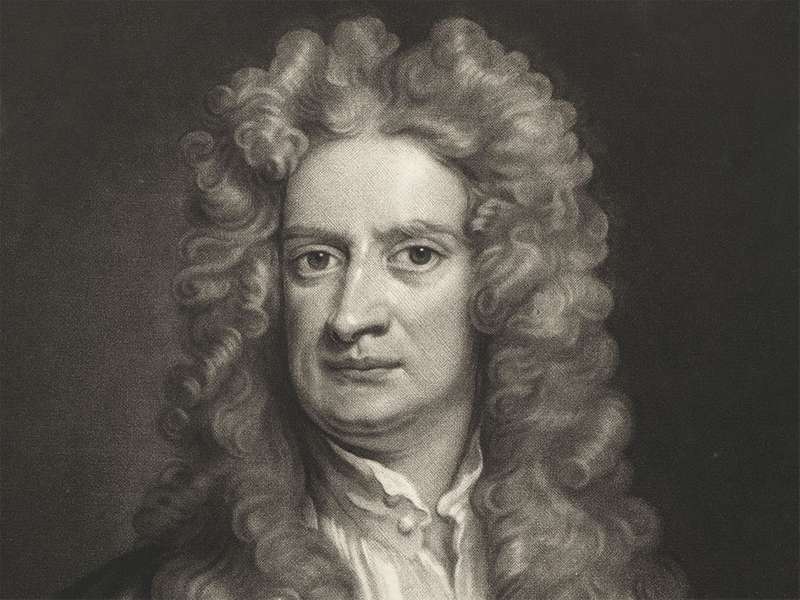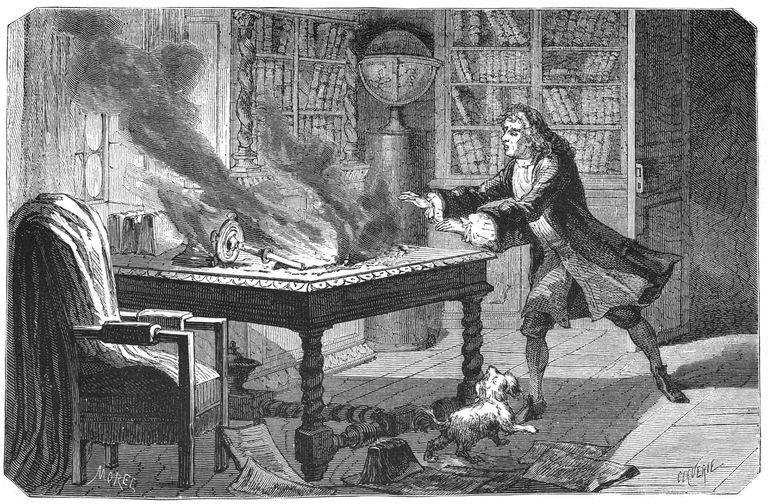Sir Isaac Newton lay the groundwork for our understanding of the world, earning the title of “the father of modern science.” He was a jack-of-all-trades who revolutionized mathematics, physics, and astronomy. Beyond that, he was a bit of a celebrity in England, leading a fascinating life outside of his scientific work. Here are some interesting facts about Newton’s life.

1.) Though his birthday is technically January 4, 1643, at the time, he was born on Christmas Day. When England adopted the Gregorian Calendar, his birth date was adjusted 11 days, making January 4 his new birthday.
2.) Newton was born prematurely, and his mother didn’t expect him to live through childhood. She mentioned that immediately after birth, he could fit into a quart mug.
3.) Sir Isaac Newton’s father was also named Isaac Newton. He died three months before his son’s birth. His mother remarried Reverend Barnabas Smith when he was three. Because Smith did not want him, they abandoned him to live with his grandmother. His relationship with his stepfather was tense to the point where he had threatened to burn their house down with them inside.
4.) Religion was a central part of Newton’s life, though his beliefs were unorthodox. He kept an exact diary of his sins for most of his life and took even small lapses seriously. Ironically, Newton would have been considered a heretic. He believed Christ was not god, and worship of him was idolatry.
5.) Some people believe that Newton attempted to predict the end of the world by writing the year 2060 in one of his later manuscripts. When you look deeper, you can see that the year was taken out of context.
6.) The Great Plague of 1665 may have helped Newton’s academic career. Because Trinity College shut down temporarily, Isaac spent two years at his family home of Woolsthorpe Manor. At home, he made progress on his most famous theories on calculus, gravity, and optics.
7.) Newton returned to Trinity College as a fellow in 1667. At the time, England required the Church of England to ordain fellows at its colleges in the Church of England. He received special dispensation from King Charles I waiving this requirement. The church would likely have forced him out due to his heretical beliefs.
8.) Newton was shy because he suffered from a stutter. This puts him in the company of other famous stutterers like Joe Biden, Lewis Carroll, Marilyn Monroe, and James Earl Jones.
9.) Even before Newton published Philosophiae Naturalis Principia Mathematica, he was a famous academic in England. He was named the second Lucasian Professor of Mathematics, one of the most prestigious academic positions in England. Newton held this job for 33 years, the fourth-longest tenure in the 350 years the position existed. Other famous Lucasian professors include Stephen Hawking, George Gabriel Stokes, and Charles Babbage.
10.) Newton may have wiped his greatest rival from history. Starting in 1679, Robert Hooke and Newton began an intense correspondence on gravity. After Newton published Philosophiae Naturalis Principia Mathematica, Hooke asserted that he had given him the idea, which Newton denied. After Hooke died, some believe that Newton destroyed his only remaining portrait. Newton’s quote, “If I have seen further it is only by standing on the shoulders of Giants,” was thought by some to be a dig at Hooke due to his small stature.
11.) The thing about the apple falling on his head? It didn’t happen that way. Instead, Isaac Newton got the inspiration from watching an apple fall off a tree from a window.
12.) Newton wrote extensively about the Philosopher’s Stone. When he died in 1727, many papers did not see the light of the day due to their controversial nature. In these papers, he wrote about a stone that could turn lead into gold and even be the source of an elixir of life.
13.) We often associate Newton with the law of gravity, but his work expands well beyond that. Here’s a few of his other discoveries
- Laws of Motion: He came up with three laws of motion that lay the foundation for modern physics. The first law stated that all objects will remain moving or still unless compelled to change by an external force. The second law defined how the motion of an object changes when experiencing an external force. The third law dictates for every action there’s an equal reaction
- Mathematics: Calling it “fluxions,” he invented what we today call calculus.
- Reflecting Telescope: Newton invented the reflecting telescope in 1668. By using mirrors, it was able to reflect light into an image. This was a better alternative to the refracting telescope, which modern telescopes are still based on.
14.) He was good friends with Sir Edmond Halley, who is best known for his discovery of Halley’s comet. Halley encouraged Newton to document his work on gravity in Philosophiae Naturalis Principia. He edited the manuscript and even paid for its publication. Interestingly, his work in predicting Halley’s comet returning was the first provable application of Newton’s theories.
15.) A fire destroyed his laboratory, costing him 20 years of work. Newton said that the fire was caused by a dog, but historians don’t believe he owned a dog. The fire was likely caused by a gust of wind blowing over a candle.

16.) Later in life, Newton became involved in politics. He was a member of Parliament from 1689 to 1701. In that period, the only time he spoke up was to complain about draught and request someone to close the window. He also was the warden of the Royal Mint for almost thirty years. Newton excelled in this position, successfully prosecuting over 28 forgers through evidence he gathered himself in disguise.
17.) Newton invested in the South Sea Company. When the South Sea Company collapsed in 1720, Newton lost over £20,000, which is equivalent to $3 million today.
18.) He was knighted by Queen Anne in April 1705. After Sir Francis Bacon, Isaac Newton was the second scientist to be knighted in England’s history.
19.) On March 20, 1727, Newton died in his sleep. He was buried in Westminster Abbey. Many of Europe’s elite attended his funeral, possibly including Voltaire. The autopsy found that his body contained large amounts of mercury, contributing to his eccentricity later in life.
- Tulip Mania – The Story of One of History’s Worst Financial Bubbles - May 15, 2022
- The True Story of Rapunzel - February 22, 2022
- The Blue Fugates: A Kentucky Family Born with Blue Skin - August 17, 2021